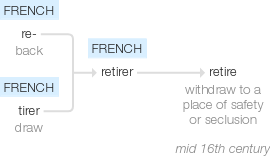Retire
mid 16th century (in the sense ‘withdraw to a place of safety or seclusion’): from French retirer, from re- ‘back’ + tirer ‘draw’.
wiktionary
From Middle French retirer(“draw back”), from prefix re-(“back”), + verb tirer(“draw, pull”), from Old French tirer, tirier(“to draw out, arrange, adorn”), from tire, tiere(“row, rank, order, dress”) of Germanic origin, akin to Old English and Old Saxon Old Saxon tīr(“fame, glory, ornament”), Old English tīer(“rank, row”), Old High German ziari, zēri(“ornament”), German German Zier(“ornament, adornment”), zieren(“to adorn”). More at tier.
From re- + tire.
etymonline
retire (v.)
1530s, of armies, "to retreat, draw back," also, of persons, "to withdraw" to some place, especially for the sake of privacy; from French retirer "to withdraw (something)," from re- "back" (see re-) + Old French tirer "to draw" (see tirade). Related: Retired; retiring.
The sense of "leave one's business or occupation" is by 1660s. The meaning "to leave company and go to bed" is from 1660s. Transitive sense is from 1540s, originally "withdraw, lead back" (troops, etc.); meaning "to remove from active service" is from 1680s. Baseball sense of "to put out" (a batter or team) is recorded by 1874.
